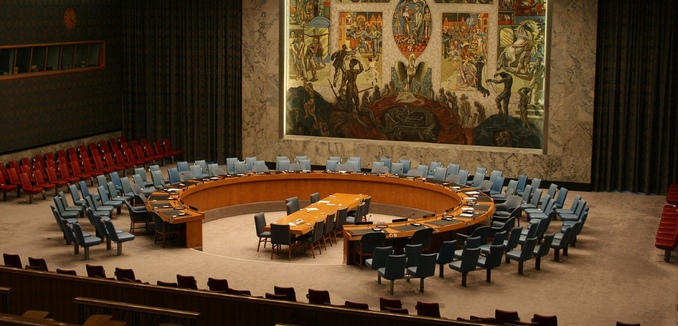The European Union and the United Nations have delayed any decision to impose sanctions on Iran after the Islamic Republic and its allies argued that its ballistic missile tests last week don’t violate the UN Security Council resolution that implemented last year’s nuclear deal, The Wall Street Journal reported (Google link) Monday.
Russian Ambassador to the UN Vitaly Churkin declared on Monday that the ballistic missile launches were not violations of Resolution 2231, which was passed after the nuclear deal was signed last July. Churkin argued that the relevant language in the resolution is non-binding. The Russian position mirrors the Iranian view that the ballistic missile restrictions in Resolution 2231 are a weakened and non-binding version of Resolution 1929, the previous UN resolution on Iran’s ballistic missile activity. China agreed with that interpretation as well.
UN Resolution 1929 stated that “Iran shall not undertake any activity related to ballistic missiles.” This resolution was, however, folded into the new resolution with different wording. Instead of consistently asserting that Iran “shall not” undertake these activities, Resolution 2231 “calls upon Iran not to undertake any activity related to ballistic missiles designed to be capable of delivering nuclear weapons.”
When Resolution 2231 passed the Security Council last July, members of Congress argued that the Obama administration had acquiesced to Russian and Iranian demands and allowed the language to be weakened. On Monday, Russia’s ambassador argued, “A call is different from a ban so legally you cannot violate a call, you can comply with a call or you can ignore the call, but you cannot violate a call. The legal distinction is there.”
While the Security Council ended up criticizing Iran for the tests, saying it damaged the “peaceful environment” created by the nuclear deal, it said that it needed more technical information to determine whether the test violated Resolution 2231, which was passed after the nuclear deal was signed.
Reporters pressed State Department spokesperson John Kirby on Monday about his statement last week Iran launching ballistic missiles would be in violation of Resolution 2231. Veteran journalist Arshad Mohammed of Reuters stated, “So, last week, you argued that it was a violation. Now, you are using very different language, that it is not consistent with — or that it is in defiance of. Why did you say it was a violation last week, unless you were certain that it was a violation? And why have you changed the language to, ‘not consistent with’ and ‘in defiance of?’” Kirby would not say that Iran’s activities violated the resolution, only that Iran is “still not acting in accordance with their obligations.”
European Union foreign policy chief Federica Mogherini also said after a meeting of the EU’s foreign ministers on Monday that while they discussed the missile tests, “When it comes to EU sanctions, the issue was not raised and no member state asked for or submitted proposals in this respect.”
Iran has fired five ballistic missiles since Resolution 2231 was passed. Following the latest launch, Rep. Ted Deutch (D-Fla.) released a statement asserting, “If the United Nations does not finally take action against these illegal missile tests, it once again calls into question the willingness to take action against Iranian violations of the nuclear agreement.” Rep. John K. Delaney (D-Md.), who has introduced legislation called the Iran Ballistic Missile Prevention and Sanctions Act, said that “Iran’s ballistic missile tests this week show the need for stricter sanctions and for hyper vigilance.”
[Photo: Jay Reed / Flickr ]




